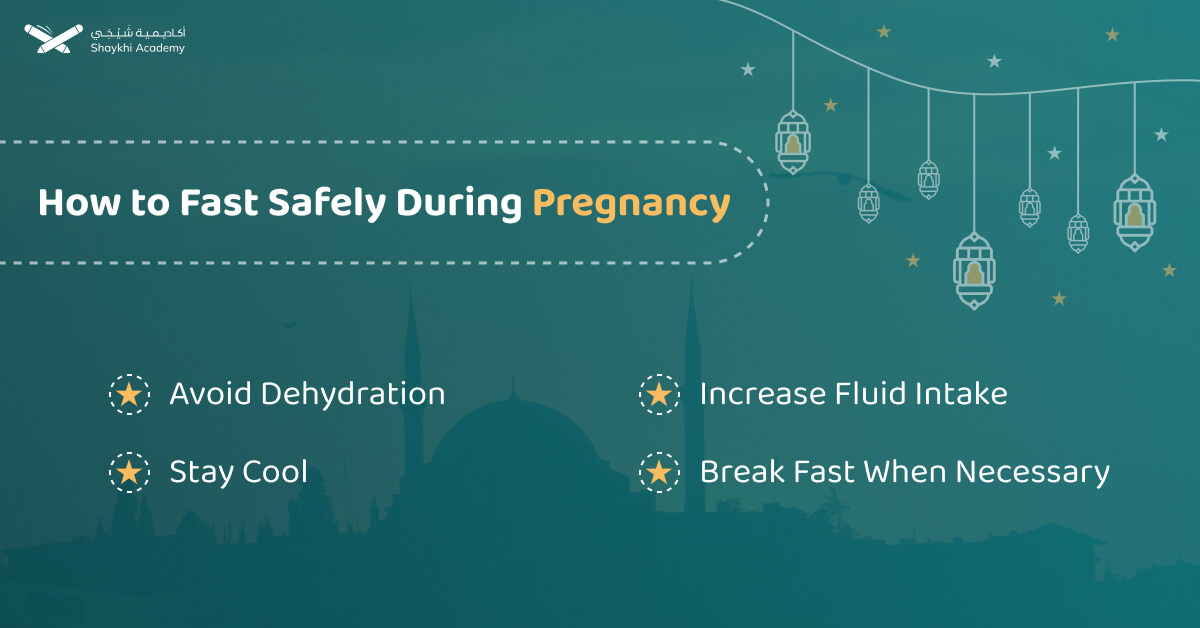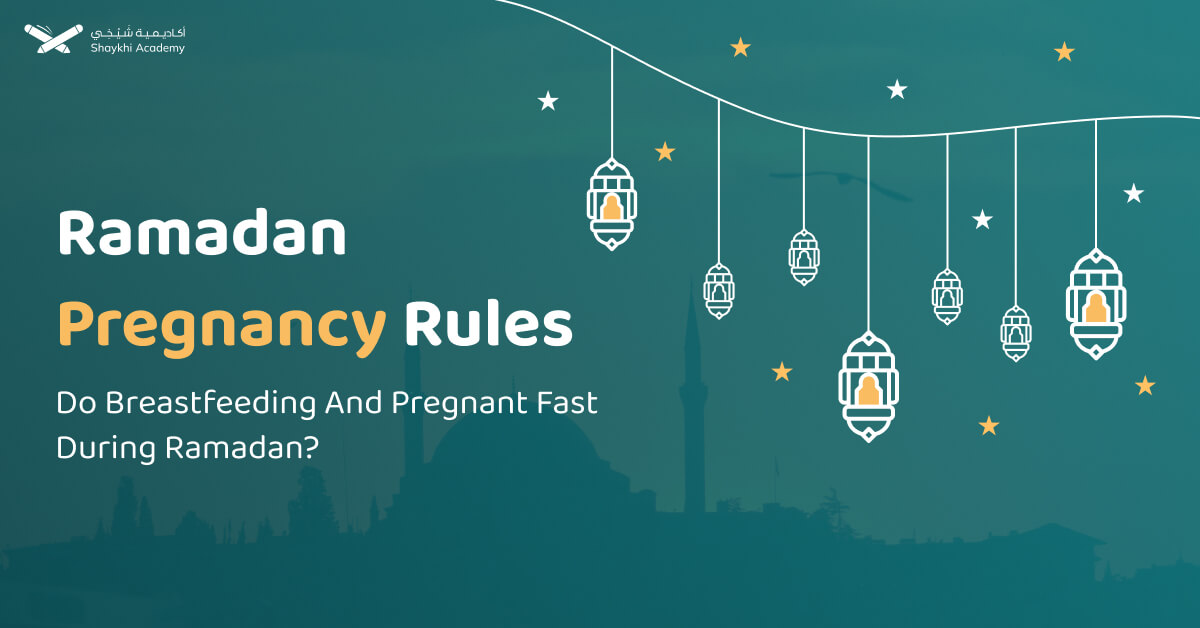Fasting during pregnancy can pose challenges such as dehydration and blood sugar fluctuations, particularly for those with diabetes. Personal factors, including health status and environmental conditions, should inform the decision to fast. Breastfeeding women must prioritize hydration, rest, and a balanced diet to support milk production and their own well-being.
Ultimately, seeking medical advice is paramount to make informed decisions about fasting during pregnancy. We encourage everyone to approach Ramadan with mindfulness and respect for their health and religious beliefs. For further guidance on Ramadan pregnancy rules, individuals can consult experts and scholars at Shaykhi Academy. We wish all Muslim readers a blessed Ramadan and encourage them to prioritize their health and spiritual well-being during this holy month.
Ramadan pregnancy rules
In adherence to Islamic law regarding Ramadan, pregnant and breastfeeding women are exempted from fasting during the month. While this is one of the exemptions for not fasting Ramadan to ensure their health and safety, it’s understandable for women accustomed to fasting annually to feel a sense of missing out, especially when family and friends are fasting together. It’s important to prioritize health during pregnancy, as fasting can pose challenges in regulating blood sugar levels, particularly for those with conditions like gestational diabetes.
For those unable to fast, alternatives such as Fidyah, a charitable contribution, or fasting at a later time to make up for missed days are recommended. Despite not fasting, individuals can remain actively engaged in Ramadan by making conscious dietary choices and dedicating time to spiritual practices. Finding ways to participate in the spiritual aspects of Ramadan while prioritizing health ensures a fulfilling and meaningful experience during this holy month.
Read Also: Ramadan Rules For Females: Fasting During Period
Do pregnant women fast during Ramadan?
Pregnant women are not required to fast during Ramadan. Although Ramadan pregnancy rules exempt them from fasting, research suggests that up to 90% of pregnant Muslim women still fast, often to maintain tradition with their families. This practice potentially exposes millions of unborn babies to intermittent fasting cycles.
However, fasting during pregnancy may increase the likelihood of preterm delivery and low birth weight. Research on the effects of Ramadan fasting on fetal health has yielded conflicting results, partly due to small sample sizes and inadequate trimester specifications. Health professionals can offer advice on the safety of fasting during Ramadan, but pregnant women often face inconsistent information and a lack of clear guidelines.
Can fasting harm my baby?
Fasting during pregnancy raises concerns about its potential impact on the health of the fetus or breastfeeding child. While fasting is not believed to affect birth weight, its effects on overall health remain unclear, leading experts to advise against fasting during pregnancy, especially for those with diabetes or gestational diabetes.
Fasting can disrupt blood sugar levels, potentially leading to dehydration and fluctuations in blood sugar levels. Islamic law does not mandate fasting during pregnancy, allowing for missed fasts to be made up later or for alternatives like Fidyah, which involves feeding a hungry person.
Consulting with a doctor or midwife is essential to assess one’s health and the health of the unborn child before deciding whether to fast during pregnancy. Personal factors such as overall health, pregnancy stage, and environmental conditions like heat should also be considered when making this decision.
Read also: The Ruling on Tasting Food While Fasting in Ramadan
Is it OK to fast Ramadan while pregnant?
Yes, it may be ok to fast during Ramadan while pregnant. Fasting during Ramadan while pregnant is a personal decision that requires careful consideration. Research suggests potential risks, including preterm delivery and low birth weight, which can impact the child’s long-term health. However, studies have produced conflicting results, and guidelines for pregnant women fasting during Ramadan are inconsistent. Consulting healthcare professionals for personalized advice is essential to balance religious beliefs with health concerns and ensure the well-being of both the mother and the unborn child.
Do you have to make up fasts from pregnancy?
The verdict on whether expectant and nursing mothers who do not fast during Ramadan must make up for missed fasts varies among scholars. According to Imam Abu Hanifah and Ali ibn Abu Talib, women are required to make up the fasts.
Imam Ahmad and Imam Ash-Shafi`i hold a similar view. Another opinion suggests that women do not need to make up the fasts but should feed the underprivileged instead, as advocated by Abdullah ibn Abbas.
Al-Jassas states that scholars have differing opinions on this matter, with Ali suggesting making up the fasts without paying Fidyah, Ibn Abbas advocating only paying Fidyah, and Ibn Umar recommending both making up the fasts and paying Fidyah.
In Ramadan pregnancy rules, Al-Jassas said that the scholars had different opinions on this matter. He declared: There were three different viewpoints among the Salaf on this issue:
- Ali said that although they are not required to pay the Fidyah, they must make up for the missed fast.
- Ibn Abbas stated that they are not required to make up the fasts; they are only required to pay the Fidyah.
- Ibn Umar stated that they must make up for the missed fasts and pay the Fidyah.
Imam Abu Hanifah & Ali ibn Abu Talib Opinion:
Women are only required to make up the fasts. Imam Abu Hanifah had this opinion and It was the opinion of Ali ibn Abu Talib (may Allah be pleased with him) among the Companions.
Imam Ahmad and Imam Ash-Shafi`i Opition:
Women should only make up the fast if they are afraid for themselves; if they are afraid for their kids, they should make up the fasts and feed one hungry person every day. The opinions of Imam Ahmad and Imam Ash-Shafi`i are as follows. Ibn `Umar also told this to Al-Jassas.
Abdullah ibn Abbas opinion:
They do not need to make up the fasts; they simply need to feed the underprivileged. This was the opinion of Abdullah ibn Abbas among the Companions. This was also related to Ibn Qudamah from Ibn {Umar in Al-Mughni (3/37).
Can I get pregnant during Ramadan?
Yes, it’s possible to get pregnant during Ramadan. While Muslims fast from dawn to Maghrib during Ramadan, intermittent fasting like this has several health benefits.
Concerns may arise regarding whether fasting during Ramadan could affect fertility. However, studies, including one from the US, have suggested that fasting can improve sperm quality in men and regulate ovulation in women, potentially enhancing the chances of conception. Fasting helps the body replenish hormones, regulate excess cortisol (stress hormone), and eliminate toxins, which can impact fertility.
Dutch research has also shown that maintaining a healthy eating pattern and creating space in the stomach can aid weight loss and increase fertility. Additionally, fasting may activate mechanisms that help treat infertility by regulating blood vessels and hormone production, potentially making women more fertile.
Do you have to fast Ramadan after giving birth?
No, you are not required to fast during Ramadan after giving birth. According to Ramadan post-pregnancy rules, mothers who are pregnant or nursing infants are exempt from fasting and can make up for missed fasts at a later time.
This exemption is provided in Islam to ease the burden on nursing mothers, recognizing the physical demands they face in caring for their newborns. Fasting may impact milk production, especially for newborns, but older breastfed babies are less affected.
While the exemption is a mercy from Allah to support mothers in fulfilling their child’s needs, it can still be challenging to balance breastfeeding and fasting, particularly during long summer fasts.

How to Fast Safely During Pregnancy
It’s advisable to avoid fasting throughout your pregnancy for the sake of you and your unborn child’s health. However, if you choose to fast, consult your doctor first. They will consider factors like your medical history, weight, lifestyle, and gestational age to determine if fasting is safe for you.
1. Avoid Dehydration:
Particularly in hot summer months, dehydration should be avoided while fasting. Watch out for signs like thirst, dark-colored urine, dizziness, headaches, fatigue, dry mouth, and infrequent urination. When breaking your fast, replenish lost fluids and sugar with sweet drinks, salty snacks, or oral rehydration solutions. Contact your doctor if you experience symptoms of dehydration, even after sleeping.
2. Stay Cool:
Seek shade, avoid excessive exertion, and drink plenty of fluids after breaking your fast and during “suhoor” to reduce the risk of dehydration.
3. Increase Fluid Intake:
During pregnancy, your daily fluid intake may need to increase by one or two glasses. Incorporate hydrating foods like fruits, vegetables, soups, stews, and oatmeal into your “suhoor” and “iftar” meals.
4. Break Fast When Necessary:
Consider breaking your fast every few days and consult your doctor or midwife immediately if you feel unwell.
Unlock the Path to Quranic Mastery with Shaykhi Academy!
Are you seeking the finest Quranic education right from the comfort of your home? Look no further! Shaykhi Academy stands out as a premier online Quran learning platform, dedicated to providing exemplary education to both children and adults.
Why Choose Shaykhi Academy?
- Connect with highly qualified native tutors.
- Flexible scheduling to suit your busy lifestyle.
- Affordable classes tailored for all levels.
- Accessible from anywhere around the globe.
Discover Our Range of Courses:
- Arabic Noorani Qaida: Lay a solid foundation for Quranic studies.
- Online Quran Classes for Kids: Engaging lessons for lifelong learning.
- Tajweed Rules for Kids: Learn to recite with confidence.
- Quran Hifz for Kids: Step-by-step guidance to memorize the Quran.
- Quran for Adults: Introduce yourself to Quran reading and Tajweed rules.
- Online Arabic Courses: Master the language of the Quran.
- Islamic Studies: A wide range of topics related to Islam, including theology, law, Quranic studies, Hadith.
Don’t Miss Out on Your Chance to Excel!
Whether you’re a beginner or seeking advanced knowledge, Shaykhi Academy can guide you! Book your free trial now and make Ramadan 2024 your Quranic turning point!

Conclusion:
In conclusion, while Ramadan pregnancy rules offer exemptions for pregnant and nursing women, the decision to fast during pregnancy or while breastfeeding necessitates careful consideration of individual health circumstances, religious beliefs, and medical advice.
Prioritizing maternal and fetal well-being is paramount, and consulting healthcare professionals is crucial to assess the safety of fasting and explore alternatives if necessary. Maintaining hydration, following a balanced diet, and monitoring symptoms are essential practices to ensure maternal health during fasting.
Ultimately, by staying informed, respecting individual choices, and prioritizing health, expectant and nursing mothers can navigate fasting during Ramadan with confidence and peace of mind, ensuring a safe and fulfilling experience for themselves and their unborn or nursing child.
With this post, we wish to increase your awareness of Ramadan pregnancy rules and the risks associated with fasting during pregnancy. Always get medical advice before beginning a fast if you’re unsure. We would like to wish all of its Muslim clients and readers a blessed Ramadan.
Finally, if you want to learn more about Ramadan pregnancy rules, go to the Shaykhi Academy, which includes experts and scholars in the Islamic religion, they will help you with everything you want to know.

















































